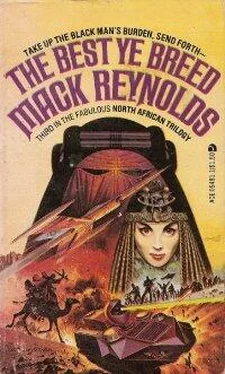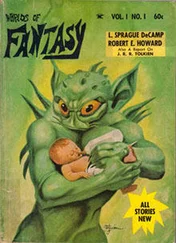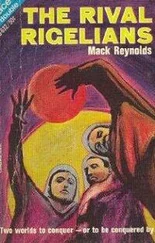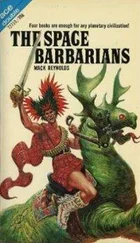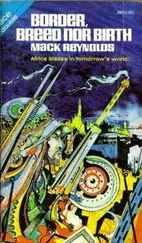Mack Reynolds - The Best Ye Breed
Здесь есть возможность читать онлайн «Mack Reynolds - The Best Ye Breed» весь текст электронной книги совершенно бесплатно (целиком полную версию без сокращений). В некоторых случаях можно слушать аудио, скачать через торрент в формате fb2 и присутствует краткое содержание. Год выпуска: 1978, ISBN: 1978, Издательство: Ace Books, Жанр: Фантастика и фэнтези, на английском языке. Описание произведения, (предисловие) а так же отзывы посетителей доступны на портале библиотеки ЛибКат.
- Название:The Best Ye Breed
- Автор:
- Издательство:Ace Books
- Жанр:
- Год:1978
- ISBN:0-441-05481-1
- Рейтинг книги:4 / 5. Голосов: 1
-
Избранное:Добавить в избранное
- Отзывы:
-
Ваша оценка:
- 80
- 1
- 2
- 3
- 4
- 5
The Best Ye Breed: краткое содержание, описание и аннотация
Предлагаем к чтению аннотацию, описание, краткое содержание или предисловие (зависит от того, что написал сам автор книги «The Best Ye Breed»). Если вы не нашли необходимую информацию о книге — напишите в комментариях, мы постараемся отыскать её.
The Best Ye Breed — читать онлайн бесплатно полную книгу (весь текст) целиком
Ниже представлен текст книги, разбитый по страницам. Система сохранения места последней прочитанной страницы, позволяет с удобством читать онлайн бесплатно книгу «The Best Ye Breed», без необходимости каждый раз заново искать на чём Вы остановились. Поставьте закладку, и сможете в любой момент перейти на страницу, на которой закончили чтение.
Интервал:
Закладка:
Homer Crawford said, “We don’t need arms.”
The colonel’s eyes narrowed. “You expect to get them from the Americans, then?”
“Nor from them, either. If we are to succeed it will be because the people themselves arise and overthrow their corrupt and inefficient present governments, not because El Hassan shoots his way to power. This so-called arms aid of the great powers is one of the greatest blots of modern history. In the name of aid, the great powers subvert and impoverish half the undeveloped nations of the world. As far back as the nineteen-seventies, the United States was selling twenty billions of dollars a year in armaments to such countries as Israel and the Arab nations who opposed her, to India and Pakistan, to Turkey and Greece. When these nations fought, both sides were armed by America. She sold billions and billions in weapons to impoverished South America, where there hadn’t been a real war in a century and where there was little chance of one developing. The arms there could only be meant for internal difficulties, in short, for the ruling class to keep down the people. El Hassan does not have to defend himself against his people.” He snorted and added, “Nor were you Soviets far behind. You too sold to anyone who would buy.”
Homer grunted contempt. “There are various facets to this so-called arms aid. Suppose we accepted from you a hundred of your most modern tanks, supposedly given free. What would happen when we ran out of the ammunition they utilized, and when we needed spare parts? Where else could we turn but to you, since such spare parts and ammunition are manufactured only in the Soviet Complex? We would be at your mercy when our new mechanized army began to deteriorate.”
He shook his head. “No thank you. And so far as your intelligence is concerned, you see how incompetent you have proven in Ifriqiyah. You Europeans and Americans stand out like sore thumbs in the Sahara. I assume you are a trained KGB agent, but the moment you stepped through that door, in spite of your disguise, we knew that you were no African.”
He shook his head again. “No, we do not welcome your assistance, sir.”
Colonel Serge Sverdlov came to his feet, knowing defeat. “Very well,” he said. “However, we shall continue to assist in your program to the point we can, in spite of your rejection.”
Cliff picked up the other’s pistol, drew the clip and emptied it of its cartridges, then with the heel of his right hand rammed it back into the butt. He handed the gun back to the Russian. “Nice knowing you,” he said.
The colonel took the gun and turned and left the tent.
Paul Kosloff and Nafi-ben-Mohammed had pulled into the small oasis settlement an hour or so before sunset and after most of the excitement had died down. They had avoided the pavilion and the multitude of natives about it and had gone into the small village proper. Kosloff was reminded somewhat of the adobe pueblos of the American southwest. There were swarms of children, swarms of flies, a sufficiency of mangy dogs too listless to bark even at strangers, and filth in plenitude.
Leaving Kosloff in the car, in a narrow, dirty alley, Nafi had gone off to discover the whereabouts of El Hassan, always assuming he was in the vicinity, and the rumors that he was had become thicker as they approached the site of the djemaa el kebar .
By the time he returned, darkness was descending as it can descend only in such areas of the world as the Sahara. One moment, it is bright daylight, a few minutes later, completely dark, save for the moon and stars.
The Moroccan boy started up the car again and drove to the other end of the settlement and parked, once more, in as isolated a spot as he could find.
He said, “El Hassan and his viziers are quartered in that larger hut, there before us.”
Paul Kosloff said, “We’ll wait for a short time, until the town settles down a bit more.” Their car didn’t seem to be overly conspicuous. The swarm of North Africans that had descended upon the oasis had brought in a considerable number of its own vehicles, as Crawford and his group had found earlier.
They witnessed Bey-ag-Akhamouk emerging and assuming the post of guard and, shortly afterward, the appearance of Serge Sverdlov, in his native costume and in his disguise as a black. He disappeared inside and remained there for possibly fifteen minutes, while Paul Kosloff ran in irritation a thumbnail back and forth over his upper lip. There seemed to be something in the other’s stance, the manner in which he held his body, that the American agent recognized but couldn’t put his finger upon.
When Sverdlov had left, Paul Kosloff slipped out of his light jacket and then removed his shoulder harness with its gun and handed it over to Nafi.
“I won’t be needing this in the presence of El Hassan,” he said. “Keep it.”
“Of course,” the Moroccan youth said, as Kosloff slipped back into the jacket and got out of the car.
Paul Kosloff walked up the street to Bey-ag-Akhamouk and said, “I’d like to see El Hassan.”
Bey looked at him quizzically. “White man, eh? And English speaking.”
“American,” Paul said.
“Long way from home,” Bey said. He leaned his Tommy-Noiseless against the mud wall and thoroughly frisked the newcomer. Then he stuck his head around the curtain and said, “This is getting to be like a convention. Another visitor. American this time. He’s clean.”
Somebody inside said something and Bey held the curtain to one side and grinned at Kosloff and said, “Enter into the presence of El Hassan.”
Paul Kosloff went on through and found himself in a small room, furnished only with camping equipment. Aside from a man on an army cot, snoring slightly as he slept, there were three men present, behind a folding camp table. All were blacks, and all dressed in military khakis.
The one in the middle gestured to an empty folding chair across from him.
Paul said, “Professor Crawford? I am Paul Kosloff, presently, in a roundabout way, of the American State Department, and assigned to open preliminary negotiations with you.”
Homer Crawford nodded and said, “And these are my aides, Kenneth Ballalou and Clifford Jackson.”
Kenny said musingly, “Paul Kosloff, Paul Kosloff. I’ve read a bit about you. The so-called Cold War’s Lawrence of Arabia.”
Paul looked at him and said, “In the kind of work I am usually assigned, we seldom welcome publicity.”
He looked back at El Hassan. He had to play this right. It couldn’t be too obvious, or he’d never get his opening. He had to look authentic. These three were no fools.
He said, in answer to Homer Crawford’s questioning look, “Frankly, El Hassan, my superiors have doubts about some elements of your program and would like them resolved before they grant you the all-out support the State Department will possibly provide.”
The big black’s smile was wry. “We have just had—and refused—another offer of support, Mr. Kosloff. But please proceed.”
Paul Kosloff said earnestly, “Of prime importance is your proposal to double or more the price of the raw materials we are at present buying in Morocco, Algeria and other areas you plan to take over. Can we assume this is but a campaign promise, as our politicians call them in the States? That is, you don’t really plan to go through with it?”
El Hassan shook his head. “No. It is no empty promise, Mr. Kosloff.”
“But if the other underdeveloped nations go along with you, it could eventually mean the collapse of the economies of the West.”
El Hassan nodded his head this time. “Yes, the collapse of the economies of the West, as we know them today.”
Paul Kosloff stared at him.
Kenny Ballalou spoke up. “You see, Mr. Kosloff, the economies of the West and of Japan are destroying our world with their ever expanding production. Within decades, there will literally be no more raw materials. Our oil, our minerals, our forests, will have disappeared. The economies of the West, including the United States, must be forced to face reality and readjust, yours is a waste economy. Let us use a few examples of planned obsolescence in your country. You make lead batteries for your cars that are deliberately designed to wear out after a year and a half, when it is possible to build them to last practically the life of the car. And lead is growing scarce. You make electric light bulbs that burn out in one thousand hours, when they could be manufactured to last for practically the life of the house. The houses you build are slum houses in less than twenty years, though your grandparents could build them to last a century or more. All this, of course, to increase sales, to increase profits. Your socio-economic system is one based on production for profit, not for use. It is a mad system and we of the more backward countries must do something to force you to change, or when you go down to economic chaos you will drag us with you.”
Читать дальшеИнтервал:
Закладка:
Похожие книги на «The Best Ye Breed»
Представляем Вашему вниманию похожие книги на «The Best Ye Breed» списком для выбора. Мы отобрали схожую по названию и смыслу литературу в надежде предоставить читателям больше вариантов отыскать новые, интересные, ещё непрочитанные произведения.
Обсуждение, отзывы о книге «The Best Ye Breed» и просто собственные мнения читателей. Оставьте ваши комментарии, напишите, что Вы думаете о произведении, его смысле или главных героях. Укажите что конкретно понравилось, а что нет, и почему Вы так считаете.
